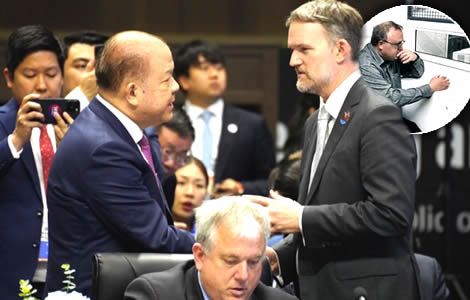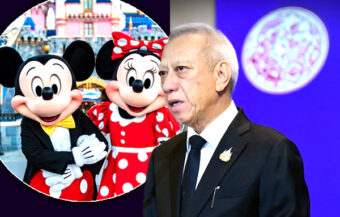Thai trade minister meets US negotiator Greer at APEC summit in Korea as July deadline looms. But hopes of a deal remain clouded by ongoing tensions over human rights and the controversial Paul Chambers case, which still threatens to derail negotiations.
Thailand’s Minister of Commerce, Pichai Naripthaphan, had what was considered a useful exchange with top US negotiator Jamieson Greer on Thursday. The Thai diplomat appeared at the Asia-Pacific Economic Cooperation (APEC) summit in Jeju, South Korea. However, this comes as Thailand continues to fall behind in the race to achieve a deal with the United States and secure a critical tariff reduction before July 8th. Certainly, there is undoubtedly concern that the issue of human rights — and particularly the treatment of US academic Paul Chamber — is inextricably linked to these talks. On Friday, his family in the United States indicated that, at this time, all the American wants to do is return home. It comes as it has been revealed that police have seized his passport and are still considering the possibility of prosecuting him in Thailand despite the local attorney general’s decision not to proceed.

Eyebrows continue to be raised over the absence of direct trade talks between Thailand and the United States. This silence comes at a critical moment. US bilateral negotiations with Vietnam are reportedly reaching a decisive stage.
According to recent reports, Washington has warned Hanoi that the current trade imbalance cannot continue indefinitely. Vietnamese negotiators were told that market access must be reciprocal. US officials are seeking urgent action before finalising any agreement.
Meanwhile, the United States has begun separate trade discussions with Cambodia. These talks mark a shift in regional focus.
Cambodia begins trade talks with Washington as Thailand risks steep tariff rise from 8 July deadline
Notably, Vietnam and Cambodia faces steeper trade barriers than Thailand, with tariffs set at 46% and 49% respectively.
Thailand, right now, faces a 10% minimum tariff regime. However, this may soon change. Without a new agreement, Thailand could face a 36% trade barrier starting 8 July 2025.
At the same time, Washington and Beijing have agreed to a temporary pause in hostilities. As a result, US tariffs on Chinese goods have been reduced to 30%. This truce allows space for renewed dialogue. It also places more pressure on countries like Thailand to engage.
Despite this urgency, Thailand has failed to engage American negotiators. Two meetings were scheduled but cancelled — the latest on 23 April. This repeated absence has triggered speculation about a diplomatic freeze between the two allies.
Moreover, growing tensions stem from two sensitive incidents. Firstly, Thai officials reportedly misled the US over the deportation of 40 Uyghur Muslims to China. That move, on 27 February, sparked outrage in Washington and among human rights groups.
Treatment of US academic Paul Chambers deepens diplomatic freeze and threatens trade breakthrough
Secondly, the arrest of US academic Paul Chambers on 8 April deepened the crisis. Chambers, a respected scholar from Naresuan University, was briefly detained and investigated for breaching lèse-majesté laws. Authorities also cited the 2007 Computer Crime Act.
The allegations stemmed from his name appearing in an online seminar announcement hosted by a foreign institution. The blurb allegedly touched on royal matters. Although the public prosecutor later dropped the charges, Thai police have not ruled out further legal action.
Importantly, Chamber’s passport remains confiscated. His visa was revoked, and he is now locked in a legal standoff. He is also challenging his abrupt dismissal from Naresuan University, which cited reputational harm and national security.
His family in the United States, including his elderly parents, have publicly called for his return. This week, they confirmed he simply wishes to go home. They fear that Thai authorities may still seek to refile charges under Article 112.
Chamber files legal challenge over dismissal as Thai authorities continue to hold travel documents
Moreover, Chambers has initiated legal proceedings to reclaim his travel documents and indeed his employment. He has also accused the university of unfair dismissal. His lawyers insist the case was politically driven and devoid of legal merit.
While this diplomatic rift lingers, some positive signals have emerged. US Secretary of Commerce Scott Bessent, viewed as a pragmatic Trump advisor, recently praised Thailand’s written trade proposals. He made the remarks while speaking at a Saudi-U.S. Investment Forum in Riyadh.
Bessent said the proposals showed “strategic alignment” and noted Thailand’s role in Indo-Pacific supply chains. However, he stopped short of confirming any breakthrough. For now, the talks remain stuck in first gear.
Still, Thai government officials insist trade dialogue remains on the agenda. Minister of Finance Pichai Chunhavajira reaffirmed that preparations are ongoing. He stated that internal discussions are underway to build trust and overcome sticking points.
Thai and US negotiators meet at the APEC summit but key concerns remain unresolved for both sides
In a key development, Commerce Minister Pichai Naripthaphan met US trade negotiator Jamieson Greer on Thursday. Their meeting took place on the sidelines of the Asia-Pacific Economic Cooperation (APEC) summit on Jeju Island, South Korea.
According to diplomatic sources, the mood was “cordial but realistic.” Greer, who is leading all tariff talks, raised several concerns. Chief among them were digital trade protections, market entry barriers and human rights issues.
In response, Naripthaphan acknowledged the friction but stressed Thailand’s willingness to resume structured negotiations. He said Thailand is open to technical cooperation and regulatory reform in certain areas. However, there continue to be hints that some political issues may need quiet resolution first.
Encouragingly, both sides agreed to establish a joint working group. Its goal is to rebuild trust and identify areas of low-risk economic cooperation. That group is expected to begin online discussions before the end of May. The United States said on Thursday such talks will be held under a standard Non-Disclosure Agreement (NDA).
Greer says he would be delighted to visit Thailand as Bangkok fights to avoid painful tariff shock
Notably, Mr Pichai invited Mr Greer to visit Thailand. The 45-year-old US top negotiator said he would be delighted to visit the Kingdom if the opportunity arises.
Observers say the Jeju meeting was not substantive, but it was a useful exchange. Thailand remains keen to avoid trade penalties that would hurt its export-driven economy. US officials, meanwhile, are looking for reliable regional partners amid rising tensions with China.
Yet the Chambers case remains a major obstacle. Washington has made clear it is watching the outcome closely. If Thailand fails to resolve the issue soon, it could jeopardise progress on trade.
PM Paetongtarn confirms her father Thaksin will be in court on June 13th. Trade proposals sent to the US
Top economist warns Thailand must get talks going with the United States after US-China 90-day pause is unveiled
Prime Minister Paetongtarn visits Vietnam this week as Hanoi readies to surpass Thailand’s ailing economy
For now, the clock is ticking. Thailand has less than two months to avoid a steep tariff increase. Unless negotiations begin soon, its access to the US market could shrink dramatically.
Despite this risk, Thailand’s diplomatic signals remain mixed. While technical teams are quietly working, senior-level outreach is still missing. Until both sides sit down officially, trade prospects remain uncertain. Indeed, patience in both Bangkok and Washington, over whatever block there is between the two countries, may be wearing thin.


















